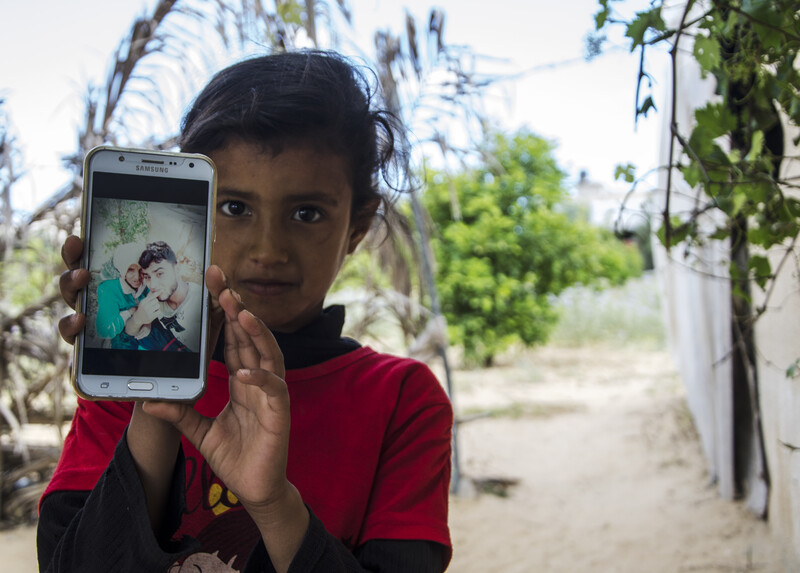The Electronic Intifada Gaza Strip 10 May 2016

Um Hani’s granddaughter displays a photo showing her grandmother with another relative.
Zaina Attia al-Amour, known as Um Hani, was harvesting wheat when Israel attacked.
“I heard a loud explosion,” said her brother Tayseer, who was nearby. “I rushed to the farm after I saw smoke in the sky. When I found Um Hami she was covered in blood.”
Tayseer could tell almost immediately how his 54-year-old sister was killed. The Israeli military had fired shells towards the farm. Overcome by grief, Tayseer began screaming and kicking sand in the direction of the troops on the boundary between Gaza and present-day Israel.
Um Hani lived in the neighborhood of al-Foukhari in southern Gaza.
Its people have suffered enormously from Israeli aggression.
Al-Foukhari was one of the areas most severely affected by Israel’s 2014 attack on Gaza. Some of the victims of that attack were trapped under the rubble of their homes for days before they could be dug out by rescue teams.
Forgiving
Um Hani displayed a great calm in that very stressful period. As the destruction occurred, her family had to evacuate their homes and seek shelter in a local school. With many people squeezed into its classrooms, it was not surprising that the atmosphere was tense.
“Um Hani helped resolve a row between myself and some other women in the school,” said her sister Fatima. “She was very forgiving and tolerant.”
The two sisters had recently talked about what should happen if Um Hani should die. Um Hani was especially concerned about a son of hers who had not yet married. She stated that what savings she had, including her cattle, should be used to provide her son with a home.
That doesn’t mean that Um Hani had a premonition of her death. The family had not been given any warning that Israel was about to attack her farm last week.
According to Israel’s version of events — reported without being questioned by the Western media — the latest attacks on Gaza were necessary to detect tunnels that Israel regards as threatening to its security. It is hard, though, to imagine what threat a small farmer like Um Hani could have posed to a state with as many weapons as Israel has in its arsenal.
Unimaginable
“We didn’t imagine that the Israeli troops would fire at the farm,” said Fatima. “They know who we are. We are local villagers, who farm our land.”
Um Hani had looked after the farm since her husband died more than a decade ago. She lived a simple life. When not working, she often watched news on a small TV set in her bedroom. She liked to be informed about current affairs. Her bedroom had little more than a mattress and a few cushions.
Earlier on the day she was killed, Um Hani had spent time playing with her grandson. She also joked with her son Ghazi about who exactly owned a new animal on the farm.
“She said to me, ‘Ghazi, the new sheep is mine, not yours,’” Ghazi recalled. “She was teasing us; she wanted to have fun. I didn’t know it was the last time I would see her smile.”
Rami Almeghari is a journalist and university lecturer based in the Gaza Strip.





